- Home
- Anthony Trollope
The Belton Estate
The Belton Estate Read online
E-text prepared by Andrew Turekand revised by Rita Bailey and Joseph E. Loewenstein, M.D.
THE BELTON ESTATE
by
ANTHONY TROLLOPE
First published in serial form in the _Fortnightly Review_in 1865 and in book form the same year
CONTENTS
I. THE REMNANTS OF THE AMEDROZ FAMILY. II. THE HEIR PROPOSES TO VISIT HIS COUSINS. III. WILL BELTON. IV. SAFE AGAINST LOVE-MAKING. V. NOT SAFE AGAINST LOVE-MAKING. VI. SAFE AGAINST LOVE-MAKING ONCE AGAIN. VII. MISS AMEDROZ GOES TO PERIVALE. VIII. CAPTAIN AYLMER MEETS HIS CONSTITUENTS. IX. CAPTAIN AYLMER'S PROMISE TO HIS AUNT. X. SHOWING HOW CAPTAIN AYLMER KEPT HIS PROMISE. XI. MISS AMEDROZ IS TOO CANDID BY HALF. XII. MISS AMEDROZ RETURNS HOME. XIII. MR. WILLIAM BELTON TAKES A WALK IN THE COUNTRY. XIV. MR. WILLIAM BELTON TAKES A WALK IN LONDON. XV. EVIL WORDS. XVI. THE HEIR'S SECOND VISIT TO BELTON. XVII. AYLMER PARK. XVIII. MRS. ASKERTON'S STORY. XIX. MISS AMEDROZ HAS ANOTHER CHANCE. XX. WILLIAM BELTON DOES NOT GO OUT HUNTING. XXI. MRS. ASKERTON'S GENEROSITY. XXII. PASSIONATE PLEADING. XXIII. THE LAST DAY AT BELTON. XXIV. THE GREAT NORTHERN RAILWAY HOTEL. XXV. MISS AMEDROZ HAS SOME HASHED CHICKEN. XXVI. THE AYLMER PARK HASHED CHICKEN COMES TO AN END. XXVII. ONCE MORE BACK TO BELTON. XXVIII. MISS AMEDROZ IS PURSUED. XXIX. THERE IS NOTHING TO TELL. XXX. MARY BELTON. XXXI. TAKING POSSESSION. XXXII. CONCLUSION.
CHAPTER I.
THE REMNANTS OF THE AMEDROZ FAMILY.
Mrs. Amedroz, the wife of Bernard Amedroz, Esq., of Belton Castle,and mother of Charles and Clara Amedroz, died when those childrenwere only eight and six years old, thereby subjecting them to thegreatest misfortune which children born in that sphere of life can bemade to suffer. And, in the case of this boy and girl the misfortunewas aggravated greatly by the peculiarities of the father'scharacter. Mr. Amedroz was not a bad man,--as men are held to be badin the world's esteem. He was not vicious,--was not a gambler or adrunkard,--was not self-indulgent to a degree that brought upon himany reproach; nor was he regardless of his children. But he was anidle, thriftless man, who, at the age of sixty-seven, when the readerwill first make his acquaintance, had as yet done no good in theworld whatever. Indeed he had done terrible evil; for his son Charleswas now dead,--had perished by his own hand,--and the state of thingswhich had brought about this woful event had been chiefly due to thefather's neglect.
Belton Castle is a pretty country seat, standing in a smallbut beautifully wooded park, close under the Quantock hills inSomersetshire; and the little town of Belton clusters round the parkgates. Few Englishmen know the scenery of England well, and theprettinesses of Somersetshire are among those which are the leastknown. But the Quantock hills are very lovely, with their richvalleys lying close among them, and their outlying moorlands runningoff towards Dulverton and the borders of Devonshire,--moorlands whichare not flat, like Salisbury Plain, but are broken into ravines anddeep watercourses and rugged dells hither and thither; where old oaksare standing, in which life seems to have, dwindled down to the lastspark; but the last spark is still there, and the old oaks give forththeir scanty leaves from year to year.
In among the hills, somewhat off the high road from Minehead toTaunton, and about five miles from the sea, stands the little town,or village, of Belton, and the modern house of Mr. Amedroz, whichis called Belton Castle. The village,--for it is in truth no more,though it still maintains a charter for a market, and there stillexists on Tuesdays some pretence of an open sale of grain andbutcher's meat in the square before the church-gate,--containsabout two thousand persons. That and the whole parish of Belton didonce,--and that not long ago,--belong to the Amedroz family. They hadinherited it from the Beltons of old, an Amedroz having married theheiress of the family. And as the parish is large, stretching away toExmoor on one side, and almost to the sea on the other, containingthe hamlet of Redicote, lying on the Taunton high road,--Redicote,where the post-office is placed, a town almost in itself, and onewhich is now much more prosperous than Belton,--as the property whenit came to the first Amedroz had limits such as these, the family hadbeen considerable in the county. But these limits had been straitenedin the days of the grandfather and the father of Bernard Amedroz; andhe, when he married a Miss Winterfield of Taunton, was thought tohave done very well, in that mortgages were paid off the propertywith his wife's money to such an extent as to leave him in clearpossession of an estate that gave him two thousand a year. As Mr.Amedroz had no grand neighbours near him, as the place is remoteand the living therefore cheap, and as with this income there wasno question of annual visits to London, Mr. and Mrs. Amedroz mighthave done very well with such of the good things of the world as hadfallen to their lot. And had the wife lived such would probably havebeen the case; for the Winterfields were known to be prudent people.But Mrs. Amedroz had died young, and things with Bernard Amedroz hadgone badly.
And yet the evil had not been so much with him as with that terribleboy of his. The father had been nearly forty when he married. He hadthen never done any good; but as neither had he done much harm, thefriends of the family had argued well of his future career. Afterhim, unless he should leave a son behind him, there would be noAmedroz left among the Quantock hills; and by some arrangementin respect to that Winterfield money which came to him on hismarriage,--the Winterfields having a long-dated connection with theBeltons of old,--the Amedroz property was, at Bernard's marriage,entailed back upon a distant Belton cousin, one Will Belton, whomno one had seen for many years, but who was by blood nearer to thesquire, in default of children of his own, than any other of hisrelatives. And now Will Belton was the heir to Belton Castle; forCharles Amedroz, at the age of twenty-seven, had found the miseriesof the world to be too many for him, and had put an end to them andto himself.
Charles had been a clever fellow,--a very clever fellow in the eyesof his father. Bernard Amedroz knew that he himself was not a cleverfellow, and admired his son accordingly; and when Charles had beenexpelled from Harrow for some boyish freak,--in his vengeance againsta neighbouring farmer, who had reported to the school authorities thedoings of a few beagles upon his land, Charles had cut off the headsof all the trees in a young fir plantation,--his father was proud ofthe exploit. When he was rusticated a second time from Trinity, andwhen the father received an intimation that his son's name had betterbe taken from the College books, the squire was not so well pleased;but even then he found some delight in the stories which reached himof his son's vagaries; and when the young man commenced Bohemian lifein London, his father did nothing to restrain him. Then there camethe old story--debts, endless debts; and lies, endless lies. Duringthe two years before his death, his father paid for him, or undertookto pay, nearly ten thousand pounds, sacrificing the life assuranceswhich were to have made provision for his daughter; sacrificing, to agreat extent, his own life income,--sacrificing everything, so thatthe property might not be utterly ruined at his death. That CharlesAmedroz should be a brighter, greater man than any other Amedroz,had still been the father's pride. At the last visit which Charleshad paid to Belton his father had called upon him to pledge himselfsolemnly that his sister should not be made to suffer by what hadbeen done for him. Within a month of that time he had blown hisbrains out in his London lodgings, thus making over the entireproperty to Will Belton at his father's death. At that last pretendedsettlement with his father and his father's lawyer, he had kept backthe mention of debts as heavy nearly as those to which he had owned;and there were debts of honour, too, of which he had not spoken,trusting to the next event at Newmarket to set him right. The nextevent at Newmarket had set him more wrong than ever, and so there hadcome an end to everything with Charles Amedroz.
/> This had happened in the spring, and the afflicted father,--afflictedwith the double sorrow of his son's terrible death and his daughter'sruin,--had declared that he would turn his face to the wall and die.But the old squire's health, though far from strong, was strongerthan he had deemed it, and his feelings, sharp enough, were lesssharp than he had thought them; and when a month had passed by, hehad discovered that it would be better that he should live, in orderthat his daughter might still have bread to eat and a house of herown over her head. Though he was now an impoverished man, there wasstill left to him the means of keeping up the old home; and he toldhimself that it must, if possible, be so kept that a few poundsannually might be put by for Clara. The old carriage-horses weresold, and the park was let to a farmer, up to the hall door of thecastle. So much the squire could do; but as to the putting by ofthe few pounds, any dependence on such exertion as that on his partwould, we may say, be very precarious.
Belton Castle was not in truth a castle. Immediately before the frontdoor, so near to the house as merely to allow of a broad road runningbetween it and the entrance porch, there stood an old tower, whichgave its name to the residence,--an old square tower, up which theAmedroz boys for three generations had been able to climb by meansof the ivy and broken stones in one of the inner corners,--and thistower was a remnant of a real castle that had once protected thevillage of Belton. The house itself was an ugly residence, threestories high, built in the time of George II., with low rooms andlong passages, and an immense number of doors. It was a largeunattractive house,--unattractive, that is, as regarded its ownattributes,--but made interesting by the beauty of the small park inwhich it stood. Belton Park did not, perhaps, contain much above ahundred acres, but the land was so broken into knolls and valleys,in so many places was the rock seen to be cropping up through theverdure, there were in it so many stunted old oaks, so many pointsof vantage for the lover of scenery, that no one would believe itto be other than a considerable domain. The farmer who took it, andwho would not under any circumstances undertake to pay more thanseventeen shillings an acre for it, could not be made to think thatit was in any way considerable. But Belton Park, since first itwas made a park, had never before been regarded after this fashion.Farmer Stovey, of the Grange, was the first man of that class whohad ever assumed the right to pasture his sheep in Belton chase,--asthe people around were still accustomed to call the woodlands of theestate.
It was full summer at Belton, and four months had now passed sincethe dreadful tidings had reached the castle. It was full summer,and the people of the village were again going about their ordinarybusiness; and the shop-girls, with their lovers from Redicote, wereagain to be seen walking among the oaks in the park on a Sundayevening; and the world in that district of Somersetshire was gettingitself back into its grooves. The fate of the young heir haddisturbed the grooves greatly, and had taught many in those parts tofeel that the world was coming to an end. They had not loved youngAmedroz, for he had been haughty when among them, and there had beenwrongs committed by the dissolute young squire, and grief had comefrom his misdoings upon more than one household; but to think that heshould have destroyed himself with his own hand! And then, to thinkthat Miss Clara would become a beggar when the old squire should die!All the neighbours around understood the whole history of the entail,and knew that the property was to go to Will Belton. Now Will Beltonwas not a gentleman! So, at least, said the Belton folk, who hadheard that the heir had been brought up as a farmer somewhere inNorfolk. Will Belton had once been at the Castle as a boy, now somefifteen years ago, and then there had sprung up a great quarrelbetween him and his distant cousin Charles;--and Will, who was roughand large of stature, had thrashed the smaller boy severely; and thething had grown to have dimensions larger than those which generallyattend the quarrels of boys; and Will had said something whichhad shown how well he understood his position in reference to theestate;--and Charles had hated him. So Will had gone, and had beenno more seen among the oaks whose name he bore. And the people, inspite of his name, regarded him as an interloper. To them, with theirshort memories and scanty knowledge of the past, Amedroz was morehonourable than Belton, and they looked upon the coming man as anintruder. Why should not Miss Clara have the property? Miss Clara hadnever done harm to any one!
Things got back into their old grooves, and at the end of the thirdmonth the squire was once more seen in the old family pew at church.He was a large man, who had been very handsome, and who now, in hisyellow leaf, was not without a certain beauty of manliness. He worehis hair and his beard long; before his son's death they were grey,but now they were very white. And though he stooped, there was stilla dignity in his slow step,--a dignity that came to him from naturerather than from any effort. He was a man who, in fact, did little ornothing in the world,--whose life had been very useless; but he hadbeen gifted with such a presence that he looked as though he wereone of God's nobler creatures. Though always dignified he was everaffable, and the poor liked him better than they might have done hadhe passed his time in searching out their wants and supplying them.They were proud of their squire, though he had done nothing for them.It was something to them to have a man who could so carry himselfsitting in the family pew in their parish church. They knew that hewas poor, but they all declared that he was never mean. He was areal gentleman,--was this last Amedroz of the family; therefore theycurtsied low, and bowed on his reappearance among them, and made allthose signs of reverential awe which are common to the poor when theyfeel reverence for the presence of a superior.
Clara was there with him, but she had shown herself in the pew forfour or five weeks before this. She had not been at home when thefearful news had reached Belton, being at that time with a certainlady who lived on the further side of the county, at Perivale,--acertain Mrs. Winterfield, born a Folliott, a widow, who stood to MissAmedroz in the place of an aunt. Mrs. Winterfield was, in truth, thesister of a gentleman who had married Clara's aunt,--there havingbeen marriages and intermarriages between the Winterfields andthe Folliotts, and the Belton-Amedroz families. With this lady inPerivale, which I maintain to be the dullest little town in England,Miss Amedroz was staying when the news reached her father, and whenit was brought direct from London to herself. Instantly she hadhurried home, making the journey with all imaginable speed though herheart was all but broken within her bosom. She had found her fatherstricken to the ground, and it was the more necessary, therefore,that she should exert herself. It would not do that she also shouldyield to that longing for death which terrible calamities oftenproduce for a season.
Clara Amedroz, when she first heard the news of her brother's fate,had felt that she was for ever crushed to the ground. She had knowntoo well what had been the nature of her brother's life, but shehad not expected or feared any such termination to his career asthis which had now come upon him--to the terrible affliction of allbelonging to him. She felt at first, as did also her father, thatshe and he were annihilated as regards this world, not only by anenduring grief, but also by a disgrace which would never allow heragain to hold up her head. And for many a long year much of thisfeeling clung to her;--clung to her much more strongly than to herfather. But strength was hers to perceive, even before she hadreached her home, that it was her duty to repress both the feelingof shame and the sorrow, as far as they were capable of repression.Her brother had been weak, and in his weakness had sought a coward'sescape from the ills of the world around him. She must not also be acoward! Bad as life might be to her henceforth, she must endure itwith such fortitude as she could muster. So resolving she returned toher father, and was able to listen to his railings with a fortitudethat was essentially serviceable both to him and to herself.
"Both of you! Both of you!" the unhappy father had said in his woe."The wretched boy has destroyed you as much as himself!" "No, sir,"she had answered, with a forbearance in her misery, which, terribleas was the effort, she forced herself to accomplish for his sake. "Itis not so. No thought of that need add to your grief. My p
oor brotherhas not hurt me;--not in the way you mean." "He has ruined us all,"said the father; "root and branch, man and woman, old and young,house and land. He has brought the family to an end;--ah me, to suchan end!" After that the name of him who had taken himself from amongthem was not mentioned between the father and daughter, and Clarasettled herself to the duties of her new life, striving to live asthough there was no great sorrow around her--as though no cloud-stormhad burst over her head.
The family lawyer, who lived at Taunton, had communicated the fact ofCharles's death to Mr. Belton, and Belton had acknowledged the letterwith the ordinary expressions of regret. The lawyer had alluded tothe entail, saying that it was improbable that Mr. Amedroz would haveanother son. To this Belton had replied that for his cousin Clara'ssake he hoped that the squire's life might be long spared. The lawyersmiled as he read the wish, thinking to himself that luckily no wishon the part of Will Belton could influence his old client either forgood or evil. What man, let alone what lawyer, will ever believein the sincerity of such a wish as that expressed by the heir to aproperty? And yet where is the man who will not declare to himselfthat such, under such circumstances, would be his own wish?
Clara Amedroz at this time was not a very young lady. She had alreadypassed her twenty-fifth birthday, and in manners, appearance, andhabits was, at any rate, as old as her age. She made no pretence toyouth, speaking of herself always as one whom circumstances requiredto take upon herself age in advance of her years. She did not dressyoung, or live much with young people, or correspond with othergirls by means of crossed letters; nor expect that, for her, youngpleasures should be provided. Life had always been serious with her;but now, we may say, since the terrible tragedy in the family, itmust be solemn as well as serious. The memory of her brother mustalways be upon her; and the memory also of the fact that her fatherwas now an impoverished man, on whose behalf it was her duty to carethat every shilling spent in the house did its full twelve pennies'worth of work. There was a mixture in this of deep tragedy and oflittle care, which seemed to destroy for her the poetry as well asthe pleasure of life. The poetry and tragedy might have gone handin hand together; and so might the cares and pleasures of life havedone, had there been no black sorrow of which she must be evermindful. But it was her lot to have to scrutinize the butcher's billas she was thinking of her brother's fate; and to work daily amongsmall household things while the spectre of her brother's corpse wasever before her eyes.
A word must be said to explain how it had come to pass that the lifeled by Miss Amedroz had been more than commonly serious before thattragedy had befallen the family. The name of the lady who stood toClara in the place of an aunt has been already mentioned. When a girlhas a mother, her aunt may be little or nothing to her. But whenthe mother is gone, if there be an aunt unimpeded with other familyduties, then the family duties of that aunt begin--and are assumedsometimes with great vigour. Such had been the case with Mrs.Winterfield. No woman ever lived, perhaps, with more conscientiousideas of her duty as a woman than Mrs. Winterfield of Prospect Place,Perivale. And this, as I say it, is intended to convey no scoffagainst that excellent lady. She was an excellent lady--unselfish,given to self-restraint, generous, pious, looking to find in herreligion a safe path through life--a path as safe as the facts ofAdam's fall would allow her feet to find. She was a woman fearingmuch for others, but fearing also much for herself, striving tomaintain her house in godliness, hating sin, and struggling with theweakness of her humanity so that she might not allow herself to hatethe sinners. But her hatred for the sin she found herself bound atall times to pronounce--to show it by some act at all seasons. Tofight the devil was her work--was the appointed work of every livingsoul, if only living souls could be made to acknowledge the necessityof the task. Now an aunt of that kind, when she assumes her dutiestowards a motherless niece, is apt to make life serious.
But, it will be said, Clara Amedroz could have rebelled; and Clara'sfather was hardly made of such stuff that obedience to the aunt wouldbe enforced on her by parental authority. Doubtless Clara couldhave rebelled against her aunt. Indeed, I do not know that she hadhitherto been very obedient. But there were family facts about theseWinterfield connections which would have made it difficult for herto ignore her so-called aunt, even had she wished to do so. Mrs.Winterfield had twelve hundred a year at her own disposal, and shewas the only person related to the Amedroz family from whom Mr.Amedroz had a right to have expectations on his daughter's behalf.Clara had, in a measure, been claimed by the lady, and the father hadmade good the lady's claim, and Clara had acknowledged that a portionof her life was due to the demands of Perivale. These demands hadundoubtedly made her life serious.
Life at Perivale was a very serious thing. As regards amusement,ordinarily so called, the need of any such institution was notacknowledged at Prospect House. Food, drink, and raiment wereacknowledged to be necessary to humanity, and, in accordance with therules of that house, they were supplied in plenty, and good of theirkind. Such ladies as Mrs. Winterfield generally keep good tables,thinking no doubt that the eatables should do honour to the gracethat is said for them. And Mrs. Winterfield herself always wore athick black silk dress,--not rusty or dowdy with age,--but withsome gloss of the silk on it; giving away, with secret, underhand,undiscovered charity, her old dresses to another lady of her ownsort, on whom fortune had not bestowed twelve hundred a year. AndMrs. Winterfield kept a low, four-wheeled, one-horsed little phaeton,in which she made her pilgrimages among the poor of Perivale, drivenby the most solemn of stable-boys, dressed up in a white great coat,the most priggish of hats, and white cotton gloves. At the rate offive miles an hour was she driven about, and this driving was toher the amusement of life. But such an occupation to Clara Amedrozassisted to make life serious.
In person Mrs. Winterfield was tall and thin, wearing on her browthin braids of false hair. She had suffered much from acute illhealth, and her jaws were sunken, and her eyes were hollow, and therewas a look of woe about her which seemed ever to be telling of herown sorrows in this world and of the sorrows of others in the worldto come. Ill-nature was written on her face, but in this her face wasa false face. She had the manners of a cross, peevish woman; but hermanners also were false, and gave no proper idea of her character.But still, such as she was, she made life very serious to those whowere called upon to dwell with her.
I need, I hope, hardly say that a young lady such as Miss Amedroz,even though she had reached the age of twenty-five,--for at the timeto which I am now alluding she had nearly done so,--and was not youngof her age, had formed for herself no plan of life in which heraunt's money figured as a motive power. She had gone to Perivalewhen she was very young, because she had been told to do so, and hadcontinued to go, partly from obedience, partly from habit, and partlyfrom affection. An aunt's dominion, when once well established inearly years, cannot easily be thrown altogether aside,--even thougha young lady have a will of her own. Now Clara Amedroz had a strongwill of her own, and did not at all,--at any rate in these latterdays,--belong to that school of divinity in which her aunt shonealmost as a professor. And this circumstance, also, added to theseriousness of her life. But in regard to her aunt's money she hadentertained no established hopes; and when her aunt opened her mindto her on that subject, a few days before the arrival of the fatalnews at Perivale, Clara, though she was somewhat surprised, was byno means disappointed. Now there was a certain Captain Aylmer in thequestion, of whom in this opening chapter it will be necessary to saya few words.
Captain Frederic Folliott Aylmer was, in truth, the nephew of Mrs.Winterfield, whereas Clara Amedroz was not, in truth, her niece. AndCaptain Aylmer was also Member of Parliament for the little boroughof Perivale, returned altogether on the Low Church interest,--fora devotion to which, and for that alone, Perivale was notedamong boroughs. These facts together added not a little to Mrs.Winterfield's influence and professorial power in the place, and gavea dignity to the one-horse chaise which it might not otherwise havepossessed. But
Captain Aylmer was only the second son of his father,Sir Anthony Aylmer, who had married a Miss Folliott, sister of ourMrs. Winterfield. On Frederic Aylmer his mother's estate was settled.That and Mrs. Winterfield's property lay in the neighbourhood ofPerivale; and now, on the occasion to which I am alluding, Mrs.Winterfield thought it necessary to tell Clara that the property mustall go together. She had thought about it, and had doubted about it,and had prayed about it, and now she found that such a disposition ofit was her duty.
"I am quite sure you're right, aunt," Clara had said. She knew verywell what had come of that provision which her father had attemptedto make for her, and knew also how great were her father'sexpectations in regard to Mrs. Winterfield's money.
"I hope I am; but I have thought it right to tell you. I shall feelmyself bound to tell Frederic. I have had many doubts, but I thinkI am right."
"I am sure you are, aunt. What would he think of me if, at somefuture time, he should have to find that I had been in his way?"
"The future time will not be long now, my dear."
"I hope it may; but long or short, it is better so."
"I think it is, my dear; I think it is. I think it is my duty."
It must be understood that Captain Aylmer was member for Perivale onthe Low Church interest, and that, therefore, when at Perivale he wasdecidedly a Low Churchman. I am not aware that the peculiarity stuckto him very closely at Aylmer Castle, in Yorkshire, or among hisfriends in London; but there was no hypocrisy in this, as the worldgoes. Women in such matters are absolutely false if they be notsincere; but men, with political views, and with much of theirfuture prospects in jeopardy also, are allowed to dress themselvesdifferently for different scenes. Whatever be the peculiar intereston which a man goes into Parliament, of course he has to live up tothat in his own borough. Whether malt, the franchise, or teetotalismbe his rallying point, of course he is full of it when among hisconstituents. But it is not desirable that he should be full of italso at his club. Had Captain Aylmer become Prime Minister, he wouldno doubt, have made Low Church bishops. It was the side to which hehad taken himself in that matter,--not without good reasons. Andhe could say a sharp word or two in season about vestments; he wasstrong against candles, and fought for his side fairly well. No onehad good right to complain of Captain Aylmer as being insincere; buthad his aunt known the whole history of her nephew's life, I doubtwhether she would have made him her heir,--thinking that in doing soshe was doing the best for the good cause.
The whole history of her niece's life she did know, and she knew thatClara was not with her, heart and soul. Had Clara left the old womanin doubt on this subject, she would have been a hypocrite. CaptainAylmer did not often spend a Sunday at Perivale, but when he did, hewent to church three times, and submitted himself to the yoke. He wasthinking of the borough votes quite as much as of his aunt's money,and was carrying on his business after the fashion of men. But Clarafound herself compelled to maintain some sort of a fight, though shealso went to church three times on Sunday. And there was anotherreason why Mrs. Winterfield thought it right to mention CaptainAylmer's name to her niece on this occasion.
"I had hoped," she said, "that it might make no difference in whatway my money was left."
Clara well understood what this meant, as will, probably, the readeralso. "I can't say but what it will make a difference," she answered,smiling; "but I shall always think that you have done right. Whyshould I stand in Captain Aylmer's way?"
"I had hoped your ways might have been the same," said the old lady,fretfully.
"But they cannot be the same."
"No; you do not see things as he sees them. Things that are seriousto him are, I fear, only light to you. Dear Clara, would I couldsee you more in earnest as to the only matter that is worth ourearnestness." Miss Amedroz said nothing as to the Captain'searnestness, though, perhaps, her ideas as to his ideas aboutreligion were more correct than those held by Mrs. Winterfield. Butit would not have suited her to raise any argument on that subject."I pray for you, Clara," continued the old lady; "and will do so aslong as the power of prayer is left to me. I hope,--I hope you do notcease to pray for yourself?"
"I endeavour, aunt."
"It is an endeavour which, if really made, never fails."
Clara said nothing more, and her aunt also remained silent. Soonafterwards, the four-wheeled carriage, with the demure stable-boy,came to the door, and Clara was driven up and down through thestreets of Perivale in a manner which was an injury to her. She knewthat she was suffering an injustice, but it was one of which shecould not make complaint. She submitted to her aunt, enduring thepenances that were required of her; and, therefore, her aunt hadopportunity enough to see her shortcomings. Mrs. Winterfield did seethem, and judged her accordingly. Captain Aylmer, being a man and aMember of Parliament, was called upon to bear no such penances, and,therefore, his shortcomings were not suspected.
But, after all, what title had she ever possessed to entertainexpectations from Mrs. Winterfield? When she thought of it all in herroom that night, she told herself that it was strange that her auntshould have spoken to her in such a way on such a subject. But, then,so much had been said to her on the matter by her father, so much, nodoubt, had reached her aunt's ears also, the hope that her positionwith reference to the rich widow at Perivale might be beneficial toher had been so often discussed at Belton as a make-weight againstthe extravagance of the heir, there had already been so much of thismistake, that she taught herself to perceive that the communicationwas needed. "In her honesty she has not chosen to leave me with falsehopes," said Clara to herself. And at that moment she loved her auntfor her honesty.
Then, on the day but one following this conversation as to thedestiny of her aunt's property, came the terrible tidings of herbrother's death. Captain Aylmer, who had been in London at the time,hurried down to Perivale, and had been the first to tell Miss Amedrozwhat had happened. The words spoken between them then had not beenmany, but Clara knew that Captain Aylmer had been kind to her; andwhen he had offered to accompany her to Belton, she had thanked himwith a degree of gratitude which had almost seemed to imply more ofregard between them than Clara would have acknowledged to exist. Butin moments such as those, soft words may be spoken and hands may bepressed without any of that meaning which soft words and the graspingof hands generally carry with them. As far as Taunton Captain Aylmerdid go with Miss Amedroz, and there they parted, he on his journey upto town, and she for her father's desolate house at Belton.

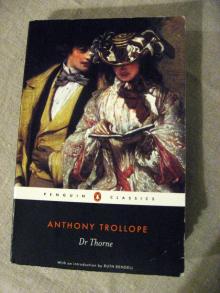 Doctor Thorne
Doctor Thorne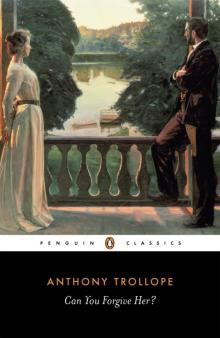 Can You Forgive Her?
Can You Forgive Her?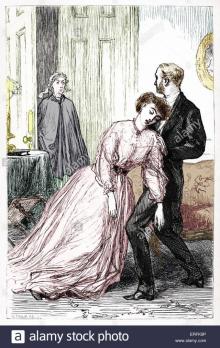 The Last Chronicle of Barset
The Last Chronicle of Barset The Fixed Period
The Fixed Period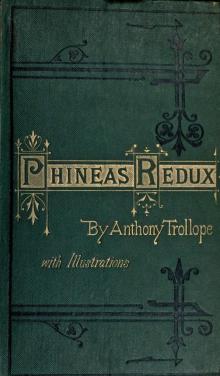 Phineas Redux
Phineas Redux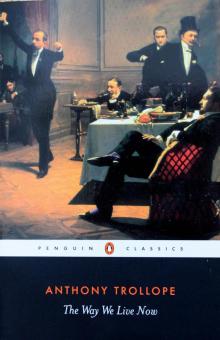 The Way We Live Now
The Way We Live Now Castle Richmond
Castle Richmond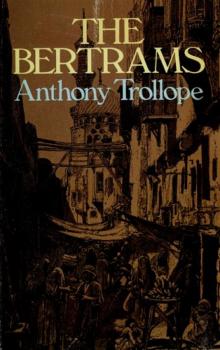 The Bertrams
The Bertrams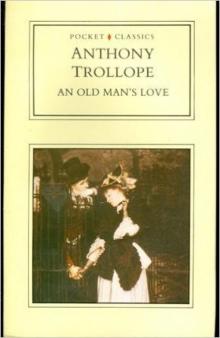 An Old Man's Love
An Old Man's Love The Belton Estate
The Belton Estate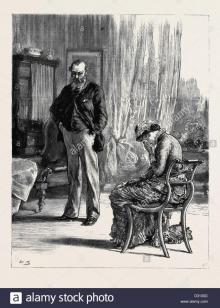 Marion Fay: A Novel
Marion Fay: A Novel The Claverings
The Claverings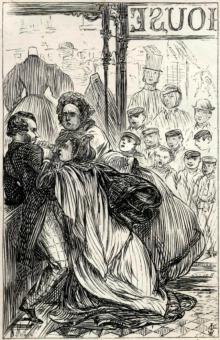 The Struggles of Brown, Jones, and Robinson
The Struggles of Brown, Jones, and Robinson Nina Balatka
Nina Balatka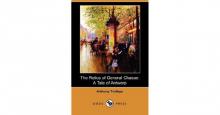 The Relics of General Chasse: A Tale of Antwerp
The Relics of General Chasse: A Tale of Antwerp Barchester Towers cob-2
Barchester Towers cob-2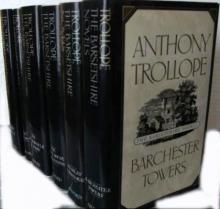 The Chronicles of Barsetshire
The Chronicles of Barsetshire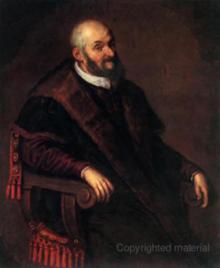 The Warden cob-1
The Warden cob-1 Framley Parsonage
Framley Parsonage Christmas at Thompson Hall
Christmas at Thompson Hall The Warden
The Warden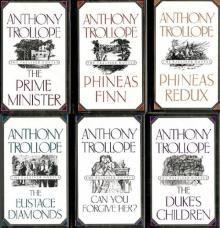 The Palliser Novels
The Palliser Novels The Small House at Allington
The Small House at Allington Barchester Towers
Barchester Towers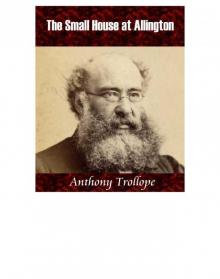 The Small House at Allington cob-5
The Small House at Allington cob-5 The Duke's Children
The Duke's Children Phineas Finn, the Irish Member
Phineas Finn, the Irish Member Autobiography of Anthony Trollope
Autobiography of Anthony Trollope